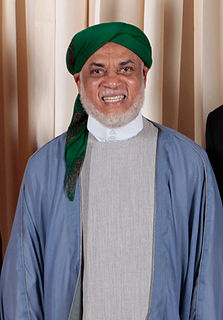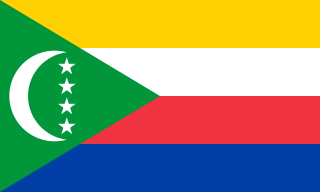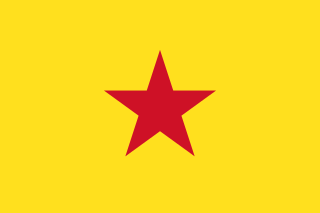
Politics of the Union of the Comoros takes place in a framework of a federal presidential republic, whereby the President of the Comoros is both head of state and head of government, and of a multi-party system. Executive power is exercised by the government. Federal legislative power is vested in both the government and parliament.

Azali Assoumani is a Comorian politician who is the President of the Comoros. He has been in office since 2016. Previously he was President from 1999 to 2002 and again from 2002 to 2006.

Elections in the Comoros take place within the framework of a multi-party democracy and a presidential system. The President and the majority of the seats in the Assembly of the Union are directly elected.

The unicameral Assembly of the Union of the Comoros is the country's legislative body. It was established in 2004, and its predecessor was the Federal Assembly.

The Assembly of the Autonomous Island of Mohéli is the island's legislative body.

Presidential elections were held in the Comoros on 16 April and 14 May 2006. As it was the turn of the island of Anjouan to hold the union presidency, a primary election was held in Anjouan on 16 April, prior to a national election on 14 May. The result was a victory for Ahmed Abdallah Mohamed Sambi, who received 58% of the vote in the national election.

Ahmed Abdallah Mohamed Sambi is a Comorian Islamic leader and politician, and former President of Comoros. He is popularly known as 'Ayatollah'. After easily winning the 14 May 2006 presidential election with 58.02% of the national vote, Sambi was inaugurated as President of the Union of the Comoros on 26 May 2006. It was the first peaceful transfer of power in the history of the Comoros.
Mohamed Djaanfari is a politician in The Comoros. He is a retired French air force officer, local transportation tycoon and Vice-President of the Assembly of the Union of the Comoros. He contested the 2006 presidential elections and ended up losing badly to Ahmed Abdallah Mohamed Sambi. He received only 13.65% of the national vote on 14 May 2006, compared to Sambi's 58.02%.
Ahmed Ben Said Djaffar is a politician in the Comoros. He is the current foreign minister under Ahmed Abdallah Mohamed Sambi since Sambi's inauguration on 28 May 2006.

The President of Anjouan is the head of Anjouan, one of the three islands of the Union of Comoros. The position was firstly established in 1997 after the Declaration of independence of Anjouan. Secondly the position became President of the autonomous island of Anjouan following the adoption of the Union of Comoros Constitution of 2001.

The invasion of Anjouan, on 25 March 2008, was an amphibious assault led by the Comoros, backed by African Union (AU) forces, including troops from Sudan, Tanzania, Senegal, along with logistical support from Libya and France. The objective of the invasion was to topple Colonel Mohamed Bacar's leadership in Anjouan, an island in the Union of Comoros, when he refused to step down after a disputed 2007 election, in defiance of the federal government and the AU. The Comoros archipelago in the Indian Ocean has had a fractious history since independence from France in 1975, experiencing more than 20 coups or attempted coups.

A presidential election was held in Anjouan on 15 June and 29 June 2008 following the 2008 invasion of Anjouan to oust Mohamed Bacar as President of Anjouan. The election was won by Moussa Toybou, who defeated Mohamed Djaanfari in the second round.

Parliamentary elections were held in the Comoros on 6 December 2009, with a second round on 20 December. The elections were originally scheduled for July 2009, but were postponed until after a constitutional referendum was held in May 2009. They were then scheduled to take place on 29 November, but were delayed again. The result was a victory for the Baobab Movement, a coalition supporting President Ahmed Abdallah Mohamed Sambi.

Presidential elections were held in the Comoros on 21 February 2016, with a second round to be held on 10 April 2016, alongside elections for the Governors of the three islands. Azali Assoumani of the Convention for the Renewal of the Comoros was elected President with 41% of the vote.

The Union for the Development of the Comoros is a political alliance in the Comoros. The party's president is Mohamed Halifa.

Early presidential elections will be held in the Comoros on 24 March 2019 alongside regional elections. If required, a second round will be held on 21 April.









